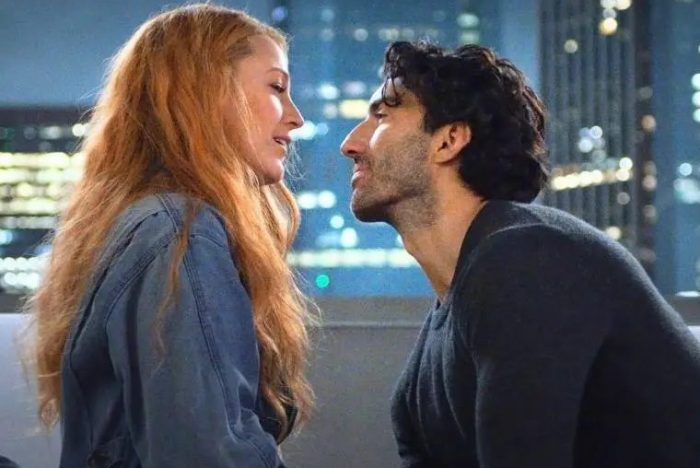Movie Review: Screen adaption of ‘It Ends With Us’ is passable

Reviewed by Jeffrey Sanzel
Colleen Hoover’s romance novel It Ends with Us, released in 2016, drew inspiration from her complicated family history. By 2019, the book sold over a million copies and was translated into over twenty languages. In 2021, the novel and Hoover’s other works gained renewed popularity from the #BookTok on TikTok. In 2022, It Ends with Us reached number one on both The New York Times and Publishers Weekly bestsellers lists, with nearly three million in print. The sequel, It Starts with Us (2018), became Simon & Schuster’s most pre-ordered book ever. (In full disclosure, this reviewer has read neither.)

Justin Baldoni (best known as Jane the Virgin’s Rafael Solana) directs his third film, following Five Feet Apart and Clouds. Christy Hall, the director/screenwriter of Daddio and co-creator of the Netflix series I Am Not Okay with This, penned the adaptation.
The writer and humorist Dorothy Parker once wrote of how often people would say: “Well, you might like it.”
Lily Blossom Bloom (Blake Lively) reluctantly attends her father’s funeral, where she attempts to deliver a heartfelt eulogy. Unable to say anything positive, she flees the church and returns to Boston. Contemplating life out on a random roof (unexplained), Ryle Kincaid (Justin Baldoni) enters in a rage, kicking a chair. Anger management issues, perhaps? Warning signs? He reveals he is a neurosurgeon who just lost a patient. This claim is much more complicated, revealed later in the narrative.
The emotionally elusive Lily and the player Ryle meet cute(ish). “Love isn’t for me; lust is nice,” he confesses. They embark on a friendship that is quickly aborted when Ryle leaves for emergency surgery. Lily opens her dream flower shop and meets quirky Allysa (Jenny Slate), who hires herself to work for Lily. The “twist” is Ryle is Allysa’s brother. Lily and Ryle rekindle the friendship, which shifts to passion. A generic build-up results in an unintentionally sparkless kiss. Love follows, ending up with marriage.
Through flashbacks, the filmmakers reveal Lily’s father (Kevin McKidd) abusing her mother (Amy Morton). Additionally, high school student Lily (Isabela Ferrer) falls in love with a homeless boy, Atlas (Alex Neustaedter). Thrown out by his mother, Atlas bided his time until he could enter the military.
In the present, Lily and Ryle coincidentally dine at Root, the restaurant the adult Atlas (Brandon Sklenar) opened upon completing his service. A love triangle results in jealous and violent reactions from Ryle, eroding the already tenuous bond.
While little new is on offer, It Ends with Us contains enough plot and potential dynamic to make for a passable film. Unfortunately, the characters are so oddly and unevenly drawn that it feels simultaneously repetitive and confusing, as if the story was told over a soundtrack of white noise. The leaden pace emphasizes the clumsy dialogue composed of sentence fragments: “Uh … uhm … okay, okay … sure … yeah … okay. Yes.” Lily describes herself as an unreliable narrator—an intriguing concept if it were true. However, she seems to be almost unimpeachably upfront.
The entire film seems to be what-you-see-is-what-you-get, down to the predictable montages: “Let’s go have fun” (karaoke and bowling), dating, and cleaning up the shop. Everything plays excruciatingly by the numbers.
It Ends with Us is a meditation and—appropriately—an indictment of abuse. Eventually, it gets to the point but still pulls its punches. Just as with its whitewashed portrait of Atlas’s homelessness, the approach is facile and softens what should be even sharper and more brutal. The idea that we hurt the ones we love hovers in the background.
One moment rises above the rest. After Ryle and Atlas lock horns, the next scene teams with raw desperation and emotional confusion. After this, it’s back to business as usual. The story’s final resolution is fair, uncompromising, but unsurprising.
Lively is a solid actor and always watchable, but the forced layers of faux mystery do not help. Between the incomplete sentences and the nervous laugh, the character is less than indelible. Baldoni tries to balance Ryle’s two sides, but neither is fully realized. Unfortunately for Sklenar, he is saddled with the least variety. Slate’s Allysa is no different from her career’s other oddballs. As Lily’s mother, Morton is capable but uncomfortable. These are strong actors, but the material fails to reach their level. One bright spot is Ferrer, who captures the essence of Lively’s grown-up Lily; it is rare for two actors to assume a role at different points in their lives and truly seem like one person.
The above opinion will most likely end up in the minority. The film grossed seven million dollars in its Wednesday and Thursday previews and is well on its way to a possible forty million dollar opening weekend. As with the novel, the story will satisfy most viewers. Just not this one.
Rated PG-13, the film is playing in local theaters.






